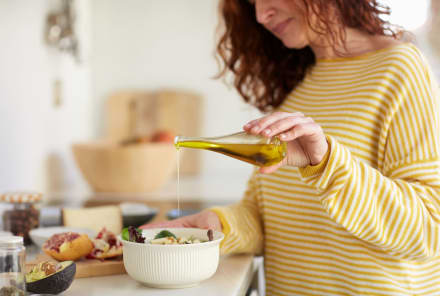Advertisement
4 Signs Of A Slow Metabolism & How To Boost It


I've spent almost 30 years studying how food and lifestyle choices affect the metabolism. The truth is, there's a lot we can do to boost metabolism. In fact, we can get better as we age—through our 30s, 40s, and well beyond our 50s!
With an efficient metabolism, you can easily maintain a healthy weight, burn fat, and enjoy feeling confident and strong by building and maintaining youthful muscle. You also experience sharper mental focus and sustained energy throughout the day without that dreaded afternoon crash that sends people lining up for a cup of joe to get through the second half of the day.
Unfortunately, many of my clients don't show up in the above condition. More likely, they are suffering from a sluggish metabolism.
Here are some of the classic signs of a slow metabolism; then I'll share my pro tips for revving your metabolism for faster weight loss, sharper mental focus, and amazing energy so you're at your best, no matter what age.
First off, what does metabolism mean?
Metabolism basically refers to all the processes in the body the convert the calories (aka energy) from the food you eat, into energy the body can use (aka ATP) for fuel.
The phrase slow metabolism often implies that these internal processes are operating on a more sluggish system—one that favors storing energy (or calories) rather than burning them.
And most people have room for improvement when it comes to optimizing their metabolism. Only about 12% of the American population is considered metabolically healthy, according to a 2019 survey.
Here are a few signs indicating that you may fit into that category.
Signs of a slow metabolism
These are just some of the most common (and noticeable) signs of a slow metabolism . See if you can relate to any of these
Weight gain that won't budge
With a slow metabolism, stubborn weight gain shows up—especially around the midsection. You'll find that even the go-to fitness routines and diets that worked in the past seem to have zero impact. This is such a prevalent condition, I've coined the term "weight loss resistance" to describe it. The good news is that there is actually a LOT you can do to turn this around (but more on that later).
Gas and bloating
Are Tums or Rolaids on your daily after-dinner menu to head off the embarrassing and uncomfortable gas and bloating that take over after every meal? You're not alone! Up to 70 million Americans suffer from some form of digestive issue, including heartburn, leaky gut, poor digestion, and malabsorption. This can lead to body aches, nutrient deficiencies, fatigue, inflammation, and a slow metabolism.
Hormone imbalances
When your metabolism is sluggish, hormones can also get out of balance. These include hormones that regulate appetite, blood sugar, sleep, and stress. You end up with dry, scaly skin and thinning hair. Check your mirror to see if you are thinning at the crown or if the ends of your eyebrows are getting sparse. Having trouble staying warm, especially in your extremities? You guessed it—that's another signal from your body that your metabolism could use a makeover.
Blood sugar imbalance
Signs of blood sugar imbalance include carb cravings and the urge to eat every few hours. Otherwise, you risk getting "hangry" and snapping at everyone around you as you storm your way toward that bag of chips or plate of cookies. After the sugar high bottoms out, you're left with the backlash of low energy, brain fog, and the overwhelming need to take a nap at your desk around 3 p.m.
If any of the above sounds familiar, don't worry because I've got some answers for you!
Here's how to boost your metabolism and burn fat
Your body is not a bank account; it's a chemistry lab. In terms of weight loss, it's not just about calories in and calories out.
The foods you eat and your lifestyle choices send signals to your body to help you thrive, or signals that can cause damage. It sounds daunting, but actually, this is great news. Because once you know what to do, you can take control and reset your metabolism. Here are some tips that will tell your metabolism to wake up and get moving:
Optimize your eating schedule
Avoid the kitchen after dinner to create a 12- to 14-hour overnight fast. This will prepare your body to burn fat the next morning.
Also, aim to eat one to two hours after waking up. Our bodies are more metabolically active in the morning (and more primed to use calories efficiently). This will help you prevent a blood sugar roller coaster and the resulting energy and mood swings.
If you nix snacking between meals and eat every four to six hours, you avoid spiking your insulin constantly and allow your body to dip into your fat stores for energy. To keep cravings at bay, make sure you have lean protein; healthy fats; and fiber at every meal. Grab a copy of my New York Times bestselling book, The Sugar Impact Diet, to get my three-step process to shift from a sugar burner to a fat burner.
Get rid of food intolerances
I wrote another NY Times bestseller all about food intolerances, The Virgin Diet, and it explains why they play such a huge part of reversing weight-loss resistance. Food intolerances cause a cascade of health issues, including leaky gut, immune reactions, and chronic inflammation, which affect metabolism. By removing the biggest culprits—which typically include gluten, dairy, soy, eggs, corn, peanuts, and sweeteners—my clients typically lose up to seven pounds in the first seven days!
Drink lots of water
Staying hydrated has been shown1 to increase metabolism by as much as 30%. Conversely, just 2% dehydration can cause2 exercise performance to suffer, impair your alertness, create an inability to focus, and encourage signs of fatigue. So make sure you're sipping water throughout the day.
The only time to slow down is when dining so you don't dilute digestive enzymes that break down food for absorption.
Start burst training (aka HIIT)
You don't have to (and actually shouldn't) spend hours on the treadmill. Excessive endurance exercises like long-distance running may actually cause your body to break down (think muscle loss!), stress your immune system, and may even cause weight gain. There are so many benefits to this type of cardio exercise3 (including stress and anxiety reduction and immediate calorie burn), but it shouldn't be the only area of focus.
To get your body into fat-burning mode and kick up your metabolism, try burst training, otherwise known as high-intensity interval training (HIIT). When you do this first thing in the morning, it causes an oxygen deficit that your body needs to make up during the day, which will cause greater fat loss4.
Manage stress
Stress is an unavoidable part of life, but when it becomes chronic, your stress hormone cortisol starts to work against you by breaking down muscle, storing fat, and causing insulin resistance5.
To boost your metabolism, make de-stressing a priority: Meditate, pencil in time with a bestie, or indulge in a relaxing bath with lavender essential oil and candles.
Get serious about sleep
Make sure you get seven to nine hours of uninterrupted sleep every night. This will boost your human growth hormone (hello, fat burn) and quiet your hunger hormones.
Now, it's your turn! Follow these tips to boost your metabolism, become a fat burner, and set yourself up to be in the best shape of your life at any age.
The takeaway
Most people, especially as we age, have some signs of a slow metabolism. But the good news is, your metabolism isn't set in stone and is actually quite malleable based on your daily habits. Practicing intermittent fasting, managing stress, and sleeping well can all help common signs of a sluggish metabolism

JJ Virgin, CNS, BCHN, is a celebrity nutrition and fitness expert who helps clients lose weight fast by breaking free from food intolerance. A certified nutrition specialist, board certified Holistic Nutritionist, and Certified Exercise Physiologist, she is the author of the New York Times best-sellers The Virgin Diet: Drop 7 Foods, Lose 7 Pounds, Just 7 Days and The Virgin Diet Cookbook: 150 Easy and Delicious Recipes to Lose Weight and Feel Better Fast.
More from the author:
Functional Nutrition Training
Check out Functional Nutrition Coaching
A cutting-edge nutrition deep dive taught by 20+ top health & wellness experts
Learn moreMore from the author:
Functional Nutrition Training
Check out Functional Nutrition Coaching
A cutting-edge nutrition deep dive taught by 20+ top health & wellness experts
Learn more
JJ Virgin, CNS, BCHN, is a celebrity nutrition and fitness expert who helps clients lose weight fast by breaking free from food intolerance. A certified nutrition specialist, board certified Holistic Nutritionist, and Certified Exercise Physiologist, she is the author of the New York Times best-sellers The Virgin Diet: Drop 7 Foods, Lose 7 Pounds, Just 7 Days and The Virgin Diet Cookbook: 150 Easy and Delicious Recipes to Lose Weight and Feel Better Fast.
6 Sources
- https://academic.oup.com/jcem/article/88/12/6015/2661518
- https://www.ncbi.nlm.nih.gov/pmc/articles/PMC2908954/
- https://pubmed.ncbi.nlm.nih.gov/2062750/#:~:text=Aerobic%20exercise%20can%20also%20be,and%20modulation%20of%20stress%20levels.
- https://www.ncbi.nlm.nih.gov/pmc/articles/PMC2991639/
- https://www.ncbi.nlm.nih.gov/pubmed/26830350
- https://www.ncbi.nlm.nih.gov/pmc/articles/PMC3104765/

Lacking This Vitamin May Increase Your Fracture Risk By Up To 48%
Molly Knudsen, M.S., RDN

What Does "Bad" Gut Bacteria Actually Mean & How Can I Get Rid Of It?
Christine Tara Peterson, PhD, AHP, RYT

This Color Food Dye Was Is Linked to Gut Inflammation & IBD
Gretchen Lidicker, M.S.

Lacking This Vitamin May Increase Your Fracture Risk By Up To 48%
Molly Knudsen, M.S., RDN

What Does "Bad" Gut Bacteria Actually Mean & How Can I Get Rid Of It?
Christine Tara Peterson, PhD, AHP, RYT

This Color Food Dye Was Is Linked to Gut Inflammation & IBD
Gretchen Lidicker, M.S.

Lacking This Vitamin May Increase Your Fracture Risk By Up To 48%
Molly Knudsen, M.S., RDN

What Does "Bad" Gut Bacteria Actually Mean & How Can I Get Rid Of It?
Christine Tara Peterson, PhD, AHP, RYT

This Color Food Dye Was Is Linked to Gut Inflammation & IBD
Gretchen Lidicker, M.S.

Lacking This Vitamin May Increase Your Fracture Risk By Up To 48%
Molly Knudsen, M.S., RDN

What Does "Bad" Gut Bacteria Actually Mean & How Can I Get Rid Of It?
Christine Tara Peterson, PhD, AHP, RYT

This Color Food Dye Was Is Linked to Gut Inflammation & IBD
Gretchen Lidicker, M.S.












